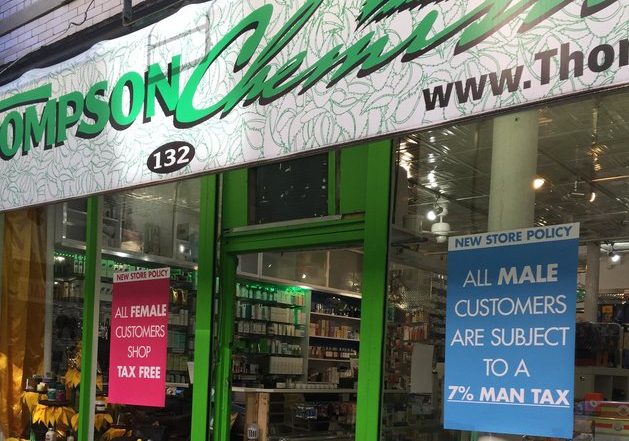When Boxed.com lowered the costs of feminine products sold on its site, it brought awareness to the issue of the “pink tax”: the higher prices charged for female-marketed products such as razors, deodorants and body wash compared to similar marketed-to-male products. But Boxed.com hasn’t been the only brand seeking to raise awareness about the pricing gap.
A recent RetailWire article spotlighted the actions of New York City pharmacy Thompson Chemists, which charged a one-day 7% “man tax” in response to the pink tax. Although the drugstore didn’t actually add on a tax for male shoppers, it did give females a 7% discount on all items throughout the store.
The 7% discount reflected a study from the New York City Department of Consumer Affairs indicating that women’s products across a wide range of hygiene categories cost 7% more than men’s products sold in the city. As if this added tax wasn’t enough, feminine hygiene products also fall under the “luxury” tax designation in 39 states, which means a 9% sales tax is charged for items such as pads and tampons.
Like many politically sensitive or gender-charged actions, the pharmacy’s tax was met with sharply divided opinions from consumers. While the move was reportedly received well in the store, it resulted in a flood of largely negative comments online as the story went viral.
RetailWire BrainTrust Debates Effectiveness Of ‘Man Tax’ Campaign
In a discussion attached to the RetailWire article, retail industry executives and experts shared their thoughts on campaigns focused on gender-price discrimination, and debated whether the “pink tax” movement is becoming a bigger issue for stores.
The following quotes were posted as part of the RetailWire discussion, titled: Pharmacy charges ‘man tax’.
Shawn Harris, North America Retail and Hospitality Industry Lead at Zebra Technologies, urged more retailers to be authentic and transparent with their pricing initiatives:
“Remember region-based price discrimination? It has all but disappeared. Mobility, and the network-effect, continues to drive consumer-side price transparency. I do think that this will become a bigger issue for retailers who choose to leave this unchecked.”
Max Goldberg, President of Max Goldberg & Associates, shared skepticism for the discounts or “taxes” put in place. He noted that the “man tax” doesn’t address the issues that set the prices for the female-marketed products in the first place.
“[It’s an] interesting gimmick to draw attention to the store, but not good for customer loyalty,” Goldberg said. “Women should not have to pay more than men for similar items, but charging male customers more is not going to affect manufacturers, the folks who set the prices. If retailers are serious about this issue they should discuss their concerns with manufacturers and, if they don’t get a satisfactory response, drop the SKUs.”
Mel Kleiman, President of Humetrics, agreed with Goldberg’s sentiment that the gimmick has worked more as an awareness technique than anything else.
“In this case, it may have made some people happy and others unhappy, but it was great marketing,” Kleiman said. “Here we are talking about what they did on a well-respected national forum.”
Although it remains debatable whether any marketing campaign related to the “pink tax” will have a significant impact on a retailer’s bottom line, today’s emphasis on cause-related marketing makes any issue brought to light by either brands or consumers hard to ignore. Jasmine Glasheen, Publishing Editor of Off-Price Retailing Magazine, says this controversy may spark retailers to assess where they stand on issues of equality, and to advertise themselves as such.
“From a branding standpoint, I’m completely for their taking a stance on the fight for equality,” Glasheen said. “I doubt these pharmacies will lose much business as a result of their charging equal rates for male and female toiletries for one day. The hands-off approach to cultural and political issues can be taken as apathy, and apathy no longer sells. Millennials and Generation Z grew up with the Desmond Tutu quote, ‘If you are neutral in situations of injustice, you have chosen the side of the oppressor,’ which translates to where we spend our dime.”













